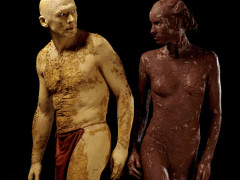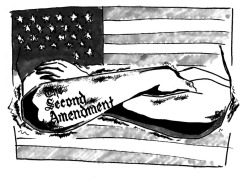This is the beginning of my commentary on Thomas Aquinas’s views of private property in Question 66, Article 2 of Summa Theologiæ.
Summa Theologiæ ST II-II, 66, 2 [ST 2a2æ 66, 2]
Article 1 Text and Commentary
Article 2 Text
Beginning of commentary (this blog)
Objection 1: Is Private Property Unnatural
Side theme: Relationship of Natural Law and Human Law
ARTICLE 2. Whether it is lawful for a man to possess a thing as his own?
My commentary:
In article 2, Aquinas shifts his attention to the topic of private property, or in his words “Whether it is lawful for a man to possess a thing as his own?” Blackfriars translates Aquinas’s question this way, “is it legitimate for individual men to possess anything as their own.” “Legitimate” seems to have a softer sense than “lawful,” though it is important to note that Aquinas uses the same term is his discussion of murder to ask whether it is illicit to kill creatures (2a2ae. 64, 1) and to kill sinners (2a2ae. 64, 2) which is about “justifiable” homicide. [1]The Latin word Aquinas uses is liceat, like the word licit and illicit.
In any case, this question in article 2 differs from the question from the previous article which focused on whether it was “natural (naturalis) for a man to possess external things.” There are thus two critical differences between this question and that question.
- First, Aquinas has shifted from the subject of taking possessions naturally to the question of private property and ownership. We shall have to make sense of the conceptual difference between natural possession and private ownership.
- Second, Aquinas shifts from the question of what’s natural to the question of what’s lawful or licit. Why did he make this shift when speaking about private property? Why did he not ask, for example, whether it was “natural” for people to have private possessions? Is that because he was already making the assumption that private possessions are not natural? Has he already proved that private property is not natural? If so, where?
These are complicated and arguably very important questions, and those who want to follow this discussion may do so here. Or you can skip ahead in the commentary.
Possession Versus Private Property in Aquinas
To restate our question, Article 2 asks whether it is unlawful or illicit for humans to have private property. The question assumes that private property is not natural. But how did Aquinas reach the conclusion that private property was not itself natural? Has Aquinas answered this question in Article 1 or elsewhere?
In article 1, Aquinas was focused on proving that it was natural for humans to possess external things. Aquinas assumed that “possessing” things was conceptually different than “owning” things. Later thinkers such as John Locke will question the possibility of distinguishing possessing from owning, since to eat fruit from what’s common, for example, in effect makes it one’s own. But Aquinas starts with the idea that one can possess something without it becoming one’s own or without the notion of ownership being invoked. Let us try to explain this distinction. For example, if one takes a drink from a stream, or fruit from a tree, or breath from the air, one could argue that one has taken from what’s common without claiming ownership of the fruit tree, the stream or the air. This could conceptually be what Aquinas means by the distinction between taking possession and ownership. As we shall see, however, Aquinas does not think natural possessions without private property can work very well in human society and therefore the institution of private property arises for very good reasons.
In our discussion of article 1, we saw that Aquinas made several points about the naturalness of possession. He suggested that God’s dominion (power over substance) and human dominion (knowledge) were of different sorts. He also suggested that human dominion was the result of human reason which made human creatures superior to other living beings since the less perfect was made for the more perfect and that this hierarchy in nature justified human dominion. This was all implied in Genesis 1:26-28 and aligned with Aristotle’s views. We saw, in addition, that in Paradise, Aquinas did not think dominion over nature included use, eating or labor since the first humans had no such needs at that time. They did not labor to eat, did not eat meat, and had no shame or inclement weather that required clothing. In Paradise, dominion meant animals would obey human commands and humans had the need only for experiential knowledge of the creatures.
For this reason, the question arose in our discussion about how possession, in the sense of use and eating, was understood to be natural since it was a post-Paradise human need? We concluded that the original dominion from Paradise could have been understood by Aquinas to be extended to justify use, eating and killing in the post-Paradise situation when humans had new natures and needs. In other words, we can extrapolate that dominion in Paradise which was based on reason and the hierarchy in nature, incorporated possession (use and eating) after Paradise. Given this possible extrapolation, we could assume that Aquinas feels he has proved that the natural law gave everything to humans in common, though he did not frame his discussion around that question or put it that way in his answer.
Why Isn’t Private Property Natural According to Aquinas?
This still leaves open our second question: why and how did Aquinas conclude that private property was not natural? Indeed, the opposite conclusion seems possible based on his arguments: if the dominion described in Paradise belonged to humans in common and if God authorized humans to use and eat animals after Paradise, why isn’t this private property understood as natural?
It is always interesting to interpret the silence of great texts or thinkers such as Aquinas. It is a great interpretive question whether to assume the writer was aware of the lacunae, had thought about it, and would have had an answer or to assume that it had slipped through his or her grasp, constituted a blind spot, or was a repression of some sort. This is a key question in the understanding of any important text and the path to resolution often differentiates strong interpretations. This is an important question here in trying to understand Aquinas on private property.
One could argue, I suppose, that Aquinas was already aware of the tradition in both Roman law and the early Church fathers that said that the rise of private property was not natural.[2]This view seems implicit in Cicero and developed in Seneca, see Richard Schlatter, Private Property: The History of an Idea, 20-26. Indeed, we had seen in our discussion of Article 1 that Ambrose had taken such a position in commenting on the Stoics. Nonetheless, it seems that one should still attribute to Aquinas his own validation of this assumption, for surely he would not have accepted this idea only because it was part of tradition, though it seems odd that he does not make the question explicit.
Another possibility is that Aquinas would say that what was not authorized at creation is not natural. Recall the example of death which did not exist until after the first couple’s sin. Aquinas concludes that “death is not natural to man” because it did not exist in Paradise. He is thus treating what was true at creation (the lack of death) as what is natural (ST IIa-IIæ, 164 [2a2ae, 164]). One could argue, then, that Aquinas only considered what existed in human nature at creation to be natural and what developed after Paradise to be unnatural. Thus anything that was the result of the original sin was not natural. Since private property and the right to use and eat creatures arose after creation, it did not constitute what is natural.
Is Human Nature After Paradise Natural Too?
There is a problem, however, with the previous reasoning, for Aquinas makes statements that seem to contradict this view. For example, in his discussion of “whether any pleasure is not natural,” he offers a definition of what is natural that would include the human condition post-Paradise. In this context, he says there are two types of “natural” when speaking about humans, those pertaining to reason and those pertaining to the senses.[3]ST I-II, 31, 7 [1a2ae, 31 ] In describing the senses as natural, he includes food, drink, and sexual pleasure:
I answer that, We speak of that as being natural, which is in accord with nature, as stated in [Aristotle] Phys. ii, 1. Now, in man, nature can be taken in two ways.
First, inasmuch as intellect and reason is the principal part of man’s nature, since in respect thereof he has his own specific nature. And in this sense, those pleasures may be called natural to man, which are derived from things pertaining to man in respect of his reason: for instance, it is natural to man to take pleasure in contemplating the truth and in doing works of virtue.
Secondly, nature in man may be taken as contrasted with reason, and as denoting that which is common to man and other animals, especially that part of man which does not obey reason. And in this sense, that which pertains to the preservation of the body, either as regards the individual, as food, drink, sleep, and the like, or as regards the species, as sexual intercourse, are said to afford man natural pleasure. [line breaks mine]
Since Aquinas is willing to call “natural” those standard pleasures that arise from the body and from reason, it would seem feasible that he could have argued that private property is natural. He could have reasoned thus: since food and clothing arise from the human condition post-Paradise, and since the hierarchy of creation made humans the more perfect beings, humans are authorized by nature to not only use, eat and kill creatures but to set aside land as their own, and labor upon it. This rationale for the naturalness of private property would seem to be a plausible argument that Aquinas could have made, especially given that Aristotle seems to assume that sustenance is natural and therefore private property arises naturally from the need to eat.[4] Aristotle does not seem to have the sharp conceptual distinction between possessions and private property that Aquinas does. I hope to develop this point in my discussion of Aristotle
Another statement of Aquinas in the same context would seem to support this hypothetical line of reasoning about the naturalness of private property. In explaining the basis of pleasure, Aquinas notes that the sense of possessing something is part of what lends pleasure to the experience. Why is this? He then cites Aristotle to the effect that the pleasure of ownership is linked to the natural love we feel for ourselves. The idea that self-love is behind the pleasure of possession and ownership certainly could have been a basis for the argument that private property is natural.
The objects of operations are not pleasurable save inasmuch as they are united to us; either by knowledge alone, as when we take pleasure in thinking of or looking at certain things; or in some other way in addition to knowledge; as when a man takes pleasure in knowing that he has something good–riches, honor, or the like; which would not be pleasurable unless they were apprehended as possessed. For as the Philosopher observes (Polit. ii, 2) “we take great pleasure in looking upon a thing as our own, by reason of the natural love we have for ourselves.” Now to have such like things is nothing else but to use them or to be able to use them: and this is through some operation. (ST I-II, 32, 1, ad. 1)
We have just outlined how Aquinas could conceivably have taken the position that private property was natural. This is not the position that Aquinas takes, however. Instead, he takes for granted the view that private property was not natural but arose as a human institution. How this set of human set of rules relates to what’s natural is thus the question he sets out to answer in the heart of this article 2.
Let’s now consider the objections Aquinas frames to the view that private property is lawful or licit.
References
| ↑1 | The Latin word Aquinas uses is liceat, like the word licit and illicit. |
|---|---|
| ↑2 | This view seems implicit in Cicero and developed in Seneca, see Richard Schlatter, Private Property: The History of an Idea, 20-26. |
| ↑3 | ST I-II, 31, 7 [1a2ae, 31 ] |
| ↑4 | Aristotle does not seem to have the sharp conceptual distinction between possessions and private property that Aquinas does. I hope to develop this point in my discussion of Aristotle |




